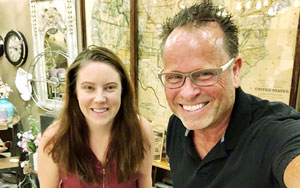
by Meaghan Brophy
“I never intended to open a brick and mortar retail store,” says Howard Aspinwall, owner of Mellow Monkey Decor. About five years ago, Howard started an online business selling curated home decor items and used a warehouse space to pack and ship orders. Surprisingly, “Customers just started showing up at my door,” he says, which is no small feat. The Mellow Monkey warehouse space is tucked away on a dead-end road, in a space that couldn’t possibly be stumbled upon by accident.
Fast forward a few years; Mellow Monkey is a thriving home decor and gift shop located in the same warehouse space in Stratford, CT. “The reaction was incredible,” Howard says. The showroom space began to overtake the ecommerce warehouse. Today, most of the warehouse space has been converted into a full retail store. A majority of Mellow Monkey’s sales now come from in-store, too.
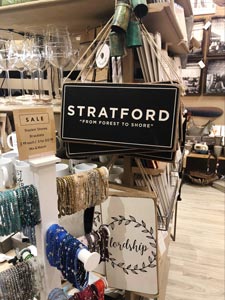 Shopping Local Is All About Feeling Good
Shopping Local Is All About Feeling Good
Howard quickly realized that having a brick and mortar storefront offers a unique opportunity “to make people’s day better.” There is a sign hanging on the wall in the back of Mellow Monkey with a quote from Maya Angelou that reads “People will forget what you said, people will forget what you did, but people will never forget how you made them feel.” Howard says he is continually trying to create memorable experiences that people will want to repeat.
Give People Something To Talk About
Part of creating a memorable experience is giving customers something to talk about. Mellow Monkey products are anything but shy, and far from what you would find at a typical chain store or big-box retailers. Mellow Monkey is filled with sassy greeting cards, wall decor declaring pride for local towns, horoscope-branded items, and other objects meant to spark connections with shoppers. “You have to have products that resonate,” says Howard. Some of Mellow Monkey’s sassiest products are the ones that sell the best. This approach is working: 20% of Mellow Monkey store inventory turns over weekly, and about 75% of store inventory turns over every three weeks.
Mellow Monkey products are sourced from trade shows, including the temporary pavilions at AmericasMart Atlanta and NY NOW. Howard also increasingly finds products online. However, he says the secret is to work with suppliers to create unique or branded products. Many of the items found in Mellow Monkey are customized with names of surrounding towns and landmarks. He also works with suppliers to create unique pieces like vintage Metro North train station signs and nautical tide clocks showing local beaches and lighthouses.
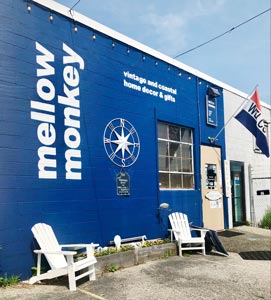 Online Is Good For Visibility, Bad For Margins
Online Is Good For Visibility, Bad For Margins
Today, many indie brick and mortar retailers are looking to build their online sales. Howard is seeking the opposite for Mellow Monkey. “We started online, but now we’re focusing on brick and mortar.” Mellow Monkey sells products on its website, through Amazon, Walmart, and other marketplaces like Houzz. However, shipping costs are increasing. Pricing on marketplaces is exceptionally competitive. Plus, online marketplaces take a percentage of each sale. So, Howard finds that in-store sales are more profitable.
But, that doesn’t mean he is discounting Mellow Monkey’s online presence. Digital advertising has been crucial for Mellow Monkey’s growth. Overall, Howard says at least half of his customers come from social media. For Mellow Monkey, online advertising through Facebook and Instagram is a daily occurrence. “Every morning when I wake up, I think ‘What’s today’s message?’” Howard also spends “a lot of money” on boosted social media posts to attract shoppers on the weekends. “It takes people a while to act [on ads]” says Howard. So, retailers need to use multiple messages and multiple mediums to reach customers.
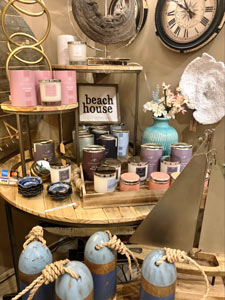 Make Your Store a Destination
Make Your Store a Destination
Having a Mainstreet storefront is excellent for catching passersby, but the location of your store does not make or break your business. When Howard chose the location of Mellow Monkey, it was supposed to be an online fulfillment center, tucked away on a back road. It turns out; there are a lot of hidden small businesses in Stratford, CT. What it lacked was a defined neighborhood.
Howard took matters into his own hands to market his store’s neighborhood as a top tourist destination in Connecticut. He coordinated with several other small businesses, including restaurants and breweries, laid out a map connecting all of the local attractions and labeled it as The Lower Loop neighborhood. Maps of Stratford’s Lower Loop are now available at many local businesses, promoted online through Shop Small Stratford (shopsmallstratford.com), and highlighted in regional news as a top tourist destination.
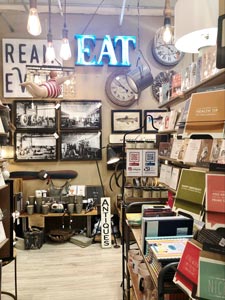 Looking Ahead
Looking Ahead
Although Mellow Monkey’s showroom started by accident, Howard is planning to keep expanding the retail space to bring in more products, including furniture. Ultimately he has a much bigger vision for Mellow Monkey and the future of Stratford’s Lower Loop. “I would love to have a large space with an open floor plan that houses many businesses, such as cafes, breweries, and retailers. I want to create something that can serve as an anchor for the community.” For many locals, Mellow Monkey is already a top destination. “We used to be a fulfillment center,” says Howard. “Now, Mellow Monkey is people’s happy place.”
